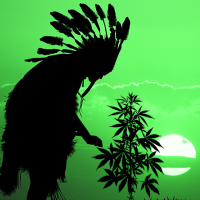Feds Said Tribes Can Grow Pot, but Mendocino County Sheriff Busts One Anyway

Mendocino County lets approved medical-marijuana growers cultivate, at most, 25 plants per parcel of land, but the Pinoleville Pomo Nation says that limit, and other constraints on big profit-making pot operations, don’t apply to the 250-member sovereign tribe.
On Tuesday, the county sheriff set out to prove they were wrong. Deputies seized around 400 plants from an indoor location on tribal land north of Ukiah and dismantled a laboratory where highly concentrated honey oil, used in marijuana edibles, was manufactured. The lab was located on property leased by the tribe in the city, where deputies also found 100 pounds of already-trimmed pot.
“In no shape or form is this even close to being legal,” Sheriff’s Captain Greg Van Patten told the Santa Rosa Press Democrat.
Tribal leaders made no secret of their plans to grow lots of marijuana and until a month ago had a deal with FoxBarry Farms, LLC, and United Cannabis to build a 110,000-square-foot indoor facility for thousands of plants. The tribe severed relations with both companies for unspecified reasons.
Although medical marijuana is legal in California and regulated on a local level, the federal government has been busting growers and distributors for years, claiming they were criminal operations because they made excessive amounts of money. Some localities have used that reasoning to limit pot operations.
Mike Canales, president of the Pinoleville Pomo Nation Business Board, told the Los Angeles Times that “everything is legal what we are doing” and ascribed the bust to “an overzealous sheriff.”
Canales may be basing his optimism on a memorandum (pdf) issued last October by the U.S. Department of Justice (DOJ) that said Native American tribes can grow and sell marijuana on their land. They just had to meet the same eight federal guidelines applied to states with legalized marijuana in any form.
They have to keep pot growing off public lands, and possession off federal property. Steps must be taken to keep it away from minors, and dealing in pot can’t be used as a cover to traffic in other illegal drugs. Drugged driving should be discouraged and guns shouldn’t be part of the cultivation and distribution process.
And then there’s the one that the feds often mention when busting growers and dispensaries in California—revenue from sales can’t go to criminal enterprises, gangs or cartels. California essentially prohibits gigantic growing enterprises, which has fostered a cottage industry of collectives fed by smaller providers.
The Ukiah Daily Journal reported that onlookers at the bust thought the bust was discriminatory. One man said, “So white boys can grow whatever they want, but Indians can’t grow s--t?”
–Ken Broder
To Learn More:
Deputies Cut Down Pinoleville Pot Plants in Ukiah (by Justine Frederiksen, Ukiah Daily Journal)
Mendocino County Sheriff’s Deputies Raid Tribe's Pot Operation Near Ukiah (by Glenda Anderson, Santa Rosa Press Democrat)
Mendocino County Sheriff Raids Native American Pot Farm That Tribe Says Is Legal (by Joseph Serna, Los Angeles Times)
U.S. Justice Department Says Tribes Can Grow and Sell Marijuana (by Ken Broder, AllGov California)
Mendocino Tribe Building $10-Million Indoor Pot-Growing Facility (by Ken Broder, AllGov California)
- Top Stories
- Controversies
- Where is the Money Going?
- California and the Nation
- Appointments and Resignations
- Unusual News
- Latest News
- California Forbids U.S. Immigration Agents from Pretending to be Police
- California Lawmakers Urged to Strip “Self-Dealing” Tax Board of Its Duties
- Big Oil’s Grip on California
- Santa Cruz Police See Homeland Security Betrayal in Use of Gang Roundup as Cover for Immigration Raid
- Oil Companies Face Deadline to Stop Polluting California Groundwater





